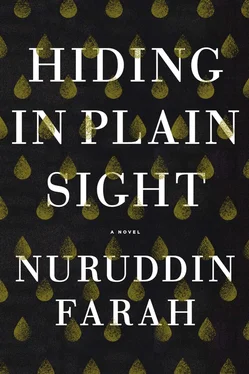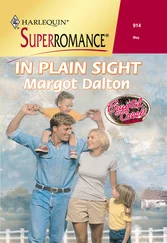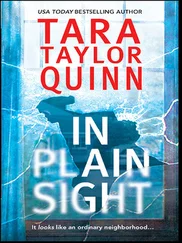When their hosts returned from work, they found themselves staring at broken chairs, tables with no legs, splintered mirrors, and doors without handles. They couldn’t make out what had happened, since neither Padmini nor Valerie would tell them. Maybe their hosts worked it out on their own or maybe they didn’t, but they stopped asking.
For Padmini and Valerie, what happened during that week in Cape Town remains the elephant in the room, and neither will admit to seeing it. From that day on, they’ve avoided any kind of conflict that might lead them back to such a precipice. Sometimes, when it threatens, one or the other of them will say, “Cape Town,” and the reminder is enough to check their rage. But the rift that happened there has never fully mended, and it has left Padmini with the suspicion that Africa itself may not be good for them.
Already they have approached acrimony on this visit over who is to blame for the fact that Dahaba came upon them on the night they were Bella’s guests in what is still, technically speaking, Aar’s house. Was it Padmini’s fault for not staying in the sofa bed or was it Valerie’s for inviting Padmini into her bigger, more comfortable bed?
Padmini, for her part, has been trying to support Valerie however she can, even though she does not wholly agree with the way Valerie is going about things. After all, Valerie stood steadfastly by her side through all the difficulties in Uganda, which stemmed from an ancient dispute involving her family. And she is sensitive to the difference between her mission there, which was purely financial, and how much is at stake for Valerie emotionally with her children.
Still, the ups and downs are hard to weather. Valerie’s conversations with Dahaba and Salif have sent her into a dramatic oscillation between frantic busyness approaching mania and almost total inertia, accompanied by a significant increase in alcohol intake. Meanwhile, their plans for the future — whether to return to their restaurant business in Pondicherry or relocate to Nairobi if Valerie finds a footing in the lives of her children — hang in the balance. Each time they make love after one of their quarrels, they talk and talk before they fall asleep, and Padmini reassures Valerie that she is innocent of blame, and as Padmini drifts off, she hopes that the morrow will bring peace back to their lives. But nothing of the sort has happened — and Valerie is all the more obsessively driven in her pursuit.
Now Valerie is gathering some of her things, as if readying to go out: wallet, room key, and body lotion.
“Where are you going, love?” Padmini asks.
“I am not going anywhere.”
But despite what she says, Valerie continues to pack her handbag, putting into it combs, a hairdryer, a change of underwear, a pair of pants, and a couple of shirts.
“Why are you fretful?”
“Because I am getting ready.”
“Cape Town” threatens.
Valerie is on the edge. And no wonder. She has slept and eaten little and drunk a lot as she schemes about how to lay her hands on the treasures that appear close, within reach — if only! There is nothing that would delight Valerie more than to forge some closeness with her children, and after that, oversee a trust in their name. And if Padmini is unhappy because Valerie closes a deal in which the children become her own again and the problems with the trust are hammered out the way she likes, then it is just too bad, she thinks. Padmini can go where she pleases. As a matter of fact, Valerie believes that since Padmini has never been a mother, there are certain maternal instincts that evade her comprehension. The same is true of Gunilla. And if only Bella were not here to spoil things and deny Valerie’s ambitions — ambitions that are for the good of the children, she is sure. She says to Padmini, “Blame it on Bella and Gunilla, dear.”
Padmini has been intent on averting disaster, but at this she cannot help but say, “I wonder who Adam would blame if there were no Eve?”
Valerie takes her handbag and heads for the door.
Padmini asks again, “Where are you going, love?”
“To the bar in the hotel to have a stiff drink.”
“Isn’t it a little early in the day?”
“You are most welcome to join me,” says Valerie.
She closes the door behind her and runs down the flights of steps, not pausing until she takes a seat in the bar. Her back is to the wall as she waits for someone to take her order and watches men and women coming and going, white-shirted, khaki-trousered, well-primed specimens every one of them. How Valerie hates them; they remind her of her father.
A waiter sporting a well-tended hairdo, yellow lips, and a nervous smile asks, “Anything, madam?” He smells of Lifebuoy soap.
“Two whiskies, three tots in each, plenty of ice on the side, and two glasses of water, please.” She adds, “My friend is joining me shortly,” even though she knows this is untrue. She will drink everything, just as she has done every day for the past few days in secret binges Padmini has not detected.
“Yes, madam,” he assures her.
“We can put the drinks bill on the room, right?”
The waiter leans down to whisper as if he were sharing a confidence with her — how his body smells, despite the Lifebuoy, she thinks. “I’m sorry, madam, cash up front. That is the hotel policy for hard liquor.”
“You go and get it,” she says.
“Cash up front, as I’ve just said, madam.”
Valerie can’t decide with whom she is angrier, the waiter, Gunilla, Bella, or the children, the multiple sources of her troubles. And to top it all off, she discovers that her wallet is bereft of cash. Enough. She is sober still, sober enough to decide she won’t be bullied by a Kenyan smelling of soap.
When she gets back to the room, Padmini is reading and doesn’t even bother to look up from her book, pretending she hasn’t noticed Valerie’s return. It is broad daylight, but Valerie gets under the covers and, weighed down with depression, goes straight to sleep.
—
Qamar and Salif are lying side by side on the bed with their shoes on, their heads on huge cushions, passing a cigarette back and forth. The windows are wide open and the two ceiling fans are doggedly running, producing scant air. Through the wall, they can hear the sounds of Zubair and Dahaba shrieking with laughter as they play computer games. Salif’s phone rings.
“Are you having a good time, darling?” Bella asks.
“Yes, Auntie, we are, thanks.” Indeed, they have been having a splendid visit, eating too much chocolate, smoking, gossiping about their friends, and taking turns telling tall tales to one another. Salif is aware that Dahaba is stiff with worry about their mother’s unscrupulousness. But he will assure Dahaba, when they are alone in their house later, that he knows a lot more than his mum does about the existing will, his father having confided this to him. Their father was more worried about the legion of his so-called Somali relatives who, like vultures, would descend to make their clan-based claim on his children and Bella’s inheritance were he to die without a will. This is why the will names Bella, his closest living blood relative, as their legal guardian.
“Will you be ready if I come to pick you up in half an hour?” asks Bella.
“Is it okay if you come in an hour instead?”
“Yes, it is. See you in an hour.” And Bella hangs up.
“I’ve been wondering,” Qamar says, trailing off.
Salif teases. “Keep going; keep wondering.”
Qamar asks, “How binding is the will of a dead person?”
Qamar has probably spoken to Dahaba, who is understandably worried about their mother’s talking the way she did about trusts, with Bella seemingly unaware of her machinations. He can imagine why Dahaba would want to know if their father’s will would protect them.
Читать дальше












